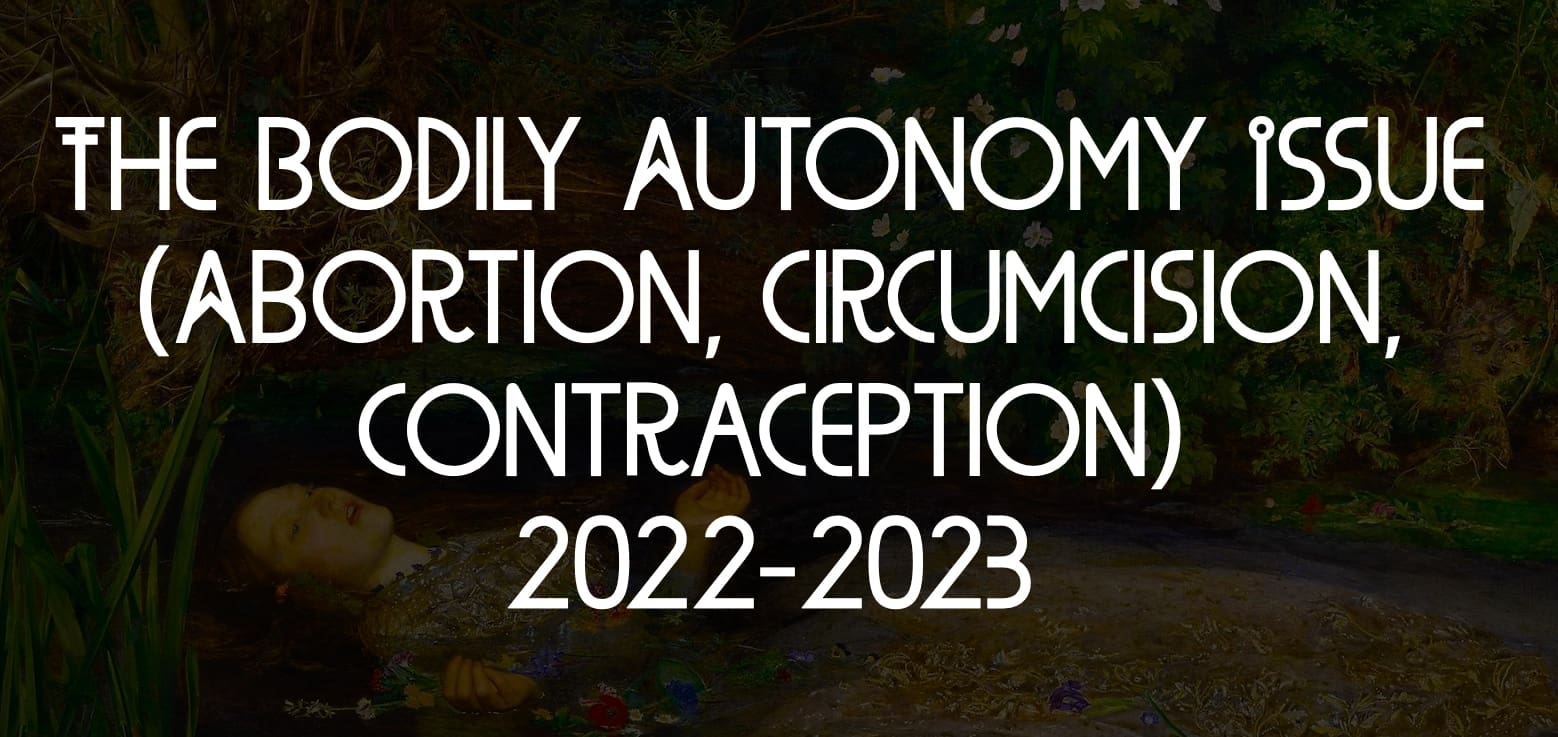From the Bodily Autonomy Special Issue: This Machine Kills Babies
Author’s Memo
This essay on bodily autonomy was written in an uncomfortable Starbucks chair in Ottawa, Ontario two days after Roe vs. Wade was overturned. My piece is specifically discussing abortion access and rights in the United States and Canada, and the politics that often follow. For example, a major theme in my piece is Canadian superiority, despite our own political ecosystem lacking accessible abortion and proper sex education.
The title “This Machine Kills Babies” is an obvious nod to “This Machine Kills Fascists”, coined by Woody Guthrie. The title’s significance is twofold, one of course being that Canada and the United States are in a state of political unrest due to fascism, and those with uteruses are becoming the scapegoat for Republican vs. Democrat, and Conservative vs. Liberal issues. Additionally, the title is alluding to those for whom Roe vs. Wade affects their day-to-day lives being treated as machines rather than human beings.
This piece is autoethnographic as I am contrasting my personal issues and feelings of lack of bodily autonomy with broader political and cultural issues within Canada. Creative nonfiction as a genre has really helped me as an author to combine the personal and political aspects of my writing.
This essay also addresses, briefly, my proximity to abortion rights as a queer person, and how queer and trans individuals are often left out of conversations about reproductive rights because it “doesn’t effect them”, with disregard for trans people, and with the idea that sexual assault can only happen to straight, cisgender women. This piece also seeks to broaden a Canadian view of “We are so much better than Americans” into something more nuanced and accurate.
I also discuss my own struggles under an often-oppressive male gaze, as I feel a lack of bodily autonomy having to zigzag down back alleys to avoid a man who is following me, even less so at the knowledge that turning around and asking him to stop could result in murder or rape. These small experiences, though seemingly insignificant, have impacted me and every woman I know. This is not an abortion issue–though it is contrasted with abortion in my piece–rather it is an issue of women in Canada and The United States living in a constant state of fear and unrest.
I am attempting throughout the piece to contrast Canadian and American culture through my personal lens and that of Canadian media. At some point in the essay I discuss Donald Trump’s election in 2016 contrasted with the small acts of bigotry (i.e., hate speech) that I began to experience day to day, despite being far from American. This huge political change so close to Canada had an effect on a macro level, with Doug Ford’s election to premier of Ontario in 2018, and a micro level, with small acts of bigotry and hatred becoming not only more common but more acceptable.
Following Doug Ford’s election, I touch on sex education in Canada, especially in the catholic education system in which I was brought up, one full of misinformation and sexism as well as homophobia and transphobia. They never discussed Plan B, sex as a queer person, protection, abortion, or any other issues that made sex and the consequences of sex, seem acceptable.
This Machine Kills Babies
The first time a man has control over your body, you are eleven and he is biking past, shouting, “Smile, baby.”
And you do, because.
He’s older than you. Bigger.
Because.
You had this first-grade teacher, the only male teacher you ever had, who spoke almost only French. He would teach you how to multiply and do other things you were, and are, bad at.
And you listened, diligently crayon-coloring in the dotted lines.
The man on the bike looks like him.
So you smile.
Baby.
It sometimes happens that him or him or that-guy-with-the-loud-muffler will speed past, instructing you to smile, look alive, lift up your shirt. They will go by too fast for you to force an ugly grimace on your face.
So you look, so you are, obedient.
When you make your first boy-friend, you agree to meet up after school. He sneaks around the corner and grabs your shoulder from behind. You scream, and almost (nearly) hit him.
He laughs, because it’s 4 PM on a Tuesday, because the sun is up, because your sweatshirt hides the steadily, terrifyingly, developing curves of your body.
Because, “Who did you think I was, anyway?”
“No one.”
And there’s a man, much too old for you, asking you if you’re in college while on your walk home. You say no. He keeps talking.
And you know you shouldn’t. But you want him to touch you, it wouldn’t take much. You want him to grab you, so you can whip around and punch him in the nose. You want him to do something to justify the fear that wraps around the sour thing in your chest and squeezes.
He doesn’t.
Later, when someone does, you keep walking anyway. A moment of fierce vindication, you decide, is not worth a pretty casket.
And you’ll say, “This outfit isn’t cute enough to get murdered in.”
And your friends will laugh.
Once, at a party in university, you and a group of girls call a phone number haphazardly scrawled onto the bathroom wall, and you expect a boyfriend, a jaded hookup, a phone-sex hotline.
You do not know who is more surprised, the group of drunk girls or the operator of the sexual assault help line.
“Sorry-fuck-sorry. We thought…. Nevermind.”
Your middle school gave vaccines in the library, and the male nurse administering the dose into your thirteen-year-old arm asks if there’s any chance you could be pregnant. You say no, there isn’t.
He looks at your body, at your slightly-too-tight skinny jeans.
“Because if there were, there would be serious risks.”
“I said I’m not.”
At the same middle school, the boys come out of the locker room after a hot gym class in May with a new inside joke. They are whispering and laughing to each other. Your one male friend fills you in:
“No means yes, yes means anal.”
And you laugh, like you smile.
Involuntarily.
“That’s the joke?”
He rolls his eyes, “Obviously we don’t actually think that.”
Right.
Who did you think I was anyway?
And in Catholic School-everything is sin or salvation. Lunch hour, recess, too short skirts.
Never “I”, always “We, Us”, Him.
Would Jesus approve of your spaghetti straps? What would the bible say about talking back to your math teacher?
Are you serving Him?
And kneel harder, pray louder, rug-burned knees cannot unbend without apology.
In sex-ed, of which there is very little, you are asked “What is the most effective form of birth control?”
And you, having just discovered the feminist internet, raise your twelve-year-old hand, “An IUD.”
And your instructor, who is also the gym teacher, says, “Any other guesses?”
And you look around, all girls, the boys are in the library. As you find out later, colouring.
What is the most effective form of birth control?
Try keeping your legs closed, you fucking slut.
What is the most effective form of birth control?
And maybe if you weren’t getting passed around like a plate of seconds at Thanksgiving dinner, you wouldn’t have to know.
What is the most effective form of birth control?
And guys can’t wear condoms; they’re uncomfortable. And if he said he was going to you’re a moron for believing him.
Your newly developed curves make sex, and the consequences, your responsibility. And if you didn’t want guys to talk to you like that, why would you leave the house? Why would you line your eyes and have a small waist and a big mouth?
And at thirteen, a man says you’re built for it. That the way you look is conducive to only one thing.
“Guys don’t want to date girls that look like you.”
Or they do- but only if the date is in their basement or bedroom.
Anywhere where they do not have to feel as though they are walking down the street hand in hand with a blow-up sex doll.
And what is the most effective form of birth control?
Abstinence.
Two days ago, when Roe vs. Wade was overturned in the United States, your Instagram feed was overrun with Canadians, like yourself, posting colourful infographics and thanking God that abortion is legal everywhere in Canada.
Have you ever seen an abortion clinic?
You’ll comb through your memory. And no, you haven’t.
If you Google “Where to get an abortion in Ottawa?” the capital of Canada, it will present you with a circle. This circle of clinics is located, for the most part, downtown, or in affluent or wealthy neighbourhoods. In the circle, there are several ambiguously named clinics, all of which you would not know performed abortions without access to the internet.
You grew up, until age ten, in a rural area. If a young person in that neighbourhood were to have access to an abortion, they would first need access to a car, or money for an Uber or cab. If they did not have that money, they would need access to a non-judgemental friend or family member to drive them forty-five minutes to and from the clinic, most of which are only open on weekdays during regular business hours. As well as this young person having a supportive friend or family member, and a car, they would need to be able to take the day, and ideally, the day afterwards, off of work.
Legalization does not mean accessibility.
And people will tell you that your lesbianism allows you a distance from the subject of abortion without any consideration or forethought for queer women with transgender bodies, or trans men for which pregnancy would bring about medical complications and gender dysphoria.
At the same catholic school, you openly identify yourself as “Pro-choice.” And a boy calls you a “Feminazi.”
“So you don’t think people should have access to abortions?”
He’ll laugh, “It’s not that deep.”
There are pro-life cartoons of babies with angel wings saying, “I had a dream.”
These, you think, are meant to inspire sympathy or shame.
A girl you know posts one on her Instagram story, as a joke. With a coat hanger emoji.
She, the boys will tell you, is cool.
And there is a man on the bus looking at you, talking to you and your textbook heavy backpack. And you try, despite yourself, to soften your heart from the hockey-puck hard mango pit it had become- try to break it down to its thorny marrow. To look in the mirror and say, “What are you so afraid of?”
The cool girl, you know, does not hold her keys between her fingers. The cool girl wears jean shorts and no makeup; she has a skateboard. She does not need to be scared of the boys because she is one of them. And you want, desperately, to be her. To be chill, low maintenance, quiet. To be good.
Your mother was born four years before abortion was legalized in the United States, and the year that “Conditional abortion” was legalized in Canada.
In 1988, “So Emotional” by Whitney Houston was released, and abortion was legalized in Canada without any conditions or restrictions.
In 2016, When Donald Trump was elected president of the United States, echoed through schools and Canadian streets was a sigh of “We are not as bad as them.”
Not as violent, not as conservative.
In 2018, your high school staged a walkout after a conservative Premier was elected, the walkout involved specifically protesting against his announcement that the sex education curriculum would be returning to its subject matter from 1998, which excluded sharing explicit content online, sexual orientation, and gender identity.
What is the most effective form of birth control?
There is a superiority that Canadians feel over Americans, one that allows for an overlooking of basic human rights. This “Not as bad” narrative creates a system in which the bar for “Bad” is alt right republicans and gun violence.
There is another infographic, one that shows how the liberal party would win the Canadian federal election in a landslide if those who voted NDP and Green Party would simply vote liberal to “Beat the Conservatives.”
In this ad, there is no information about the Liberal party or the Conservative party, only the promise that one will lose and one will win.
There is also no information about the NDP party or Green Party.
Not as violent, not as conservative.
Not as stupid and mindless as Americans.
Not as bad.
And when Roe v. Wade was re-opened in America, there were pro-life protestors on Parliament Hill in Ottawa, almost one hundred kilometers from the border between the United States and Canada.
And you say trash instead of garbage like in American TV shows, Freshman Sophomore Junior and Senior, Soda instead of Pop.
And when Donald Trump was elected, that same one hundred miles from the American border, a boy in your class called you a faggot for the first time ever.
What are you so afraid of?
And when you move to Vancouver, there is the same circle of ambiguously named clinics, almost all located in West, and upper East Vancouver. Nobody you know has a car, but everyone you know is having sex.
“I’d just have to throw myself down the stairs.”
“I knew a girl who took like twelve shots, do you think that would work?”
“Did you know there is a new straw that turns a different color when your drink is drugged? Or a scrunchie that can stretch into a lid?”
And if you’re being dragged into a car, or an alley, yell fire instead of rape.
The last time, which lasts forever, that a man has control of your body, it’s God. And he doesn’t like spaghetti straps or feminazis, and you should capitalize it to He instead of he, as a sign of respect. Liquor stores are closed on Sundays, and you should take your hat off inside. Don’t ask questions, just cover your collarbones and knees and go to confession and beg to be quieter and smaller.
And the Church is the state, and the Province, and the Country.
Featured image by Karen Nadine from Pixabay











